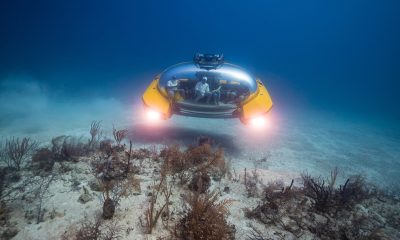Car powered by sun makes record-breaking trip on one charge
It weighs just 500kg, about one-quarter of a Tesla.
Published
1 year ago onBy
Talker News
By Dean Murray via SWNS
A car powered by the sun has made a record-breaking 1000km (621-mile) trip on a single charge.
The solar-powered Sunswift 7 averaged nearly 85kph (53mph) in under twelve hours to set a Guinness World Record.
The car, designed and built by students at UNSW Sydney, posted a verified time of 11 hours 52.08, and completed its record with just eight minutes to spare.
Completing the challenge at the Australian Automotive Research Centre (AARC) in Wensleydale, Victoria, the Sunswift Racing team now hold the record for the ‘Fastest EV over 1000km on a single charge.’
The vehicle completed 240 laps of AARC’s Highway Circuit, equivalent to more than the driving distance from Sydney to Melbourne, to break the record.

The car stopped only to allow for a change of driver every few hours – plus one tire change due to a puncture and a nerve-wracking battery management repair.
The official honor, and Guinness World Record certificate, were conferred a few days later once timing information and car telemetry data had been analyzed and confirmed by a team of experts.
Sunswift Team Manager Andrea Holden, a Mechanical Engineering student at UNSW Sydney, said: "It feels very weird to think that we’ve helped to make something that’s the best in the entire world.

“Two years ago, when we started to build this car, everything was going into lockdown and there were a lot of difficult moments.
“But it’s been so rewarding to see the whole team come together and make so much progress and get us to this amazing point.
"It was a lot of work and a lot of hours and a lot of stress, but it’s all been worth it.
“This world record is a validation of all the effort everyone in the team has put in.”

Sunswift 7 is the latest in a long line of successful solar-powered cars from UNSW since the first vehicle was produced in 1996.
It weighs just 500kg (1,102 pounds) about one-quarter of a Tesla, and boasts impressive efficiencies thanks to its aerodynamic design, the efficiency of the motors and throughout the drive chain, and incredibly low rolling resistance.
The record attempt was not without drama, with a battery management issue causing the car to come to a complete halt at one point.
The rules of the event stated Sunswift 7 could not be stationary for more than 15 minutes at a time – and it took the team 14 minutes and 52 seconds to fix the problem and get back onto the track.
Team Principal, Professor of Practice Richard Hopkins, says the world record shows what is possible and what can be achieved, albeit with a significant weight advantage over road legal cars which require a host of features, such as airbags and air conditioning systems, that Sunswift 7 does not include.

Professor Hopkins won four F1 world titles while Head of Operations at Red Bull, but ranks this Guinness record just as highly.
He says: "This is amazing, incredible. Wow. The whole year has been leading to this point and it hasn't been plain sailing. To be honest, we had our doubts about whether we were going to be able to achieve it.
"So to come here and do what we set out to do is just the most incredible feeling. I’m sure those sentiments are shared amongst the whole team."
Prof. Hopkins paid tribute to the student team, saying: "Let’s remember, these are not the best-paid professional car makers in Stuttgart working for Mercedes. This is a bunch of very smart amateurs who have taken all the ingredients and put them together in a brilliant way.
“I don’t like to call them ‘normal’ students. The reason is that UNSW is the top-ranked engineering university in Australia and this is the top engineering project within the university. So it attracts the very best.
“But these young men and women are the future and they have already demonstrated here with Sunswift what they are capable of – imagine what they will do when we let them loose on the wider world.
“This team has focused on ultimate efficiency in order to break this world record. They have shown what is ultimately achievable if you concentrate on aerodynamics, and rolling resistance and the use of smart materials.
“During this record, the energy consumption was just 3.8 kWh/100km, whereas even the most efficient EVs on the road today only achieve a rating of 15kWh/100km and the average is around 20kWh/100km.
“Sunswift 7 isn’t a production car of the future, since we’ve compromised on comfort and the cost is prohibitive. But we have shown that if you want to make cars more efficient, more sustainable, more environmentally friendly, then it is possible.
“I used to work in Formula One and nobody thinks we’ll be driving F1 cars on the road in five or 10 years. But the technology they use in F1 really pushes the boundaries and some of that filters down [to regular vehicles] and that’s what we are trying to do with Sunswift and what this world record shows is achievable.”
Stories and infographics by ‘Talker Research’ are available to download & ready to use. Stories and videos by ‘Talker News’ are managed by SWNS. To license content for editorial or commercial use and to see the full scope of SWNS content, please email [email protected] or submit an inquiry via our contact form.
You may like


Scientists explain why there are ‘spiders’ on Mars


New innovative submarine looks just like a UFO


Solar surprise: Explosions on Sun spark concerns


Photography contest highlights world’s best engagement photos


World’s oldest bird who lost mate now courting new partners


John Lennon’s lost ‘Help!’ guitar to break auction records
Other Stories


Blood test can detect signs of knee condition 8 years before X-rays
Early detection could lead to treatments that slow the progression of the most common form of arthritis.


Man captures ultra rare albino squirrel on camera
The white squirrel has red eyes so is thought to be an albino squirrel.


Adorable dog kicks his leg while he walks
A video captured the pup bouncing along the street of his native China.


Woman with rare ‘Sleeping Beauty’ condition sleeps every four hours
She was diagnosed at age 18 after years of struggling to stay awake in school and nodding off during class.


97-year-old veteran receives WWII service medal 80 years later
"We’re all so proud of Eve."
Top Talkers

 Lifestyle1 week ago
Lifestyle1 week agoWoman regrets her tattoo nightmare: ‘It’s horrendous’

 Health5 days ago
Health5 days agoNew study reveals ‘old age’ begins later than it used to

 Wildlife4 days ago
Wildlife4 days agoClever elephant returns visitor’s shoe that fell into enclosure

 Good News5 days ago
Good News5 days agoDisabled student takes first steps in 10 years on graduation stage

 Animals1 day ago
Animals1 day agoAdorable dog kicks his leg while he walks

 Entertainment2 days ago
Entertainment2 days agoWhat is the perfect movie length?

 Broadcast1 day ago
Broadcast1 day agoAre allergies interfering with your social life?

 Travel5 days ago
Travel5 days agoOne-fifth of Americans think about their next vacation while still on vacation
